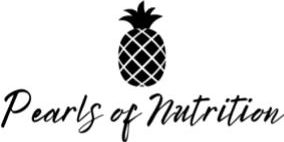
In my opinion, being an athlete is one of the most amazing things we can do! We get to play a game that we love and spend time with our best friends – what could be better. Learning how to use nutrition as one of the key tools for performance can help athletes thrive at their sport – I often describe it as a secret weapon.
It’s also important to remember that as an adolescent or teen athlete, not only are we using nutrition to excel at our sport but we also have to make sure we are supporting our bodies growth & development plus have enough energy for school, hanging out with our friends and whatever else we may like to do!
This blog post will dive into learning how to fuel our bodies for practices & games as we head into fall sports seasons!
Nutrients of Importance
Let’s chat briefly about our five food groups and their role in athletic performance:
Carbohydrates (“carbs”) are the primary source of energy for our bodies. There are two types: simple carbs (quick energy) and complex carbs (longer lasting energy). Quick carbs, like crackers, granola bars, cereal or fruit juice can be super helpful if we need energy right before a practice or game. Complex carbs like potatoes, whole wheat breads or pastas, quinoa, whole fruit or oatmeal tend to have more fiber and will digest slower which is why we consider them longer lasting energy foods. We tend to have complex carbs at most of our meals so that our energy levels are supported throughout the day. We will talk about how to incorporate both shortly.
Proteins are often thought of as helping to build muscle, which is true, but they also help support our tendons and joints which do a lot of work to support our muscles and bones. Proteins also keep us feeling full/satisfied and support our immune system. Proteins are made up of amino acids. I like to think of these amino acids as puzzle pieces. Each “puzzle piece” offers our body a different benefit so it’s important that we aren’t missing any. Some sources of protein such as beef, poultry, pork, shellfish, eggs and tofu offer us all of the puzzle pieces our body needs while some plant sources of protein like nuts, seeds, beans and legumes are missing some and need to be paired together, like rice and beans. Talking with your family about proteins you like and working with a dietitian can be helpful to ensure we can meet your body’s protein needs.
Fats are often a feared food group because of their name but I’m here to share that eating fat will not make us fat! Fats are crucial for our brain health, reducing muscle inflammation (aka muscle soreness), help to absorb fat soluble vitamins like vitamins A, D, E and K plus help to keep us full and satisfied at meals. Examples of fats are nuts, seeds, butter, sour cream, bacon, olive oil, salad dressings, avocado. Fun fact: our brain is ~60% fat. Think about how hard it would be to concentrate at our sport or in school if our brain wasn’t nourished properly!
Produce (fruits/veggies) contain a variety of vitamins and minerals that help to reduce muscle inflammation and support hydration. They are also great sources of fiber which can be helpful for digestion (preventing constipation) and in keeping our energy levels stable. We don’t have to like all fruits and veggies but having a few favorites that we can incorporate into snacks or meals each day is helpful to make sure we’re recovering our bodies well. I like to talk with my athletes about getting creative with produce like making smoothies or yogurt bowls, adding fruit into pancakes or muffins, picking a new “fruit or veggie of the week” to pack with lunches, or trying veggies with different dips like hummus or ranch dressing. One of my new favorite dips for veggies is salt and vinegar hummus!
Dairy is super unique and contains all of our life sustaining nutrients – protein, carbohydrates, fat, water, vitamins and minerals. Dairy also provides us with a really important mineral, calcium which is a huge component of our bone strength. As athletes we’re doing a lot of running, jumping, diving etc. that requires our bones to be as strong as possible to avoid injury. In addition to bone strength, calcium also plays a role in muscle contraction. We want to aim for 2-3 servings of dairy each day from foods like milk, yogurt, cheese, kefir, cottage cheese or ice cream. For more information on choosing dairy products, check out this blog post.
Nutrition Timing
Regardless of the sport you play, I recommend eating every 2-4 hours to make sure that your body is adequately nourished. Remember, each food group offers us something different and for most of our meals we want to aim for all or as many food groups as we can (carbohydrates, proteins, fats, produce and dairy). Is 3 meals enough? Probably not. Having breakfast, lunch and dinner is a great foundation but as athletes, if we only had these three meals we wouldn’t be able to meet our bodies energy needs adequately and that may put us at risk for injury. Snacks between meals can help this. We don’t need all food groups at snacks like we do meals but picking a few that pair well together can be really helpful.
Let’s talk about the timing of each food group more specifically and some ways to pair them based on what our body needs:
Nutrition Before Movement
Our focus before movement tends to be based around carbohydrates because they are our main source of energy. Whether we have 10 minutes or 2 hours before a practice or event, making sure we have carbohydrate rich food options will allow our bodies to feel and perform their best. Just like a car can’t run without gas, you can’t run with carbs.
One of the biggest barriers to eating before practice/game that I hear is not wanting to feel too full. Here’s the trick: the closer we are to practice/game time, the less fiber and food groups we need. Remember that protein, fats and high fiber foods tend to digest slower and we don’t want to feel overly full right before we start moving. This is when our body needs quick energy carbohydrate options. When we have more time, we can comfortably begin to have those higher fiber options and add in a few other food groups. It is important to note that different people have different tolerance levels for nutrition prior to activity. Additionally, the intensity of your activity may impact what you can tolerate. It is important to understand your tolerance so that you can eat accordingly.
Depending on how much time you have, use the list below to help figure out what may be the most helpful. Here are some examples:
- If you have 2-3 hours: (this may be a meal or larger snack; ~3 food groups)
- Avocado toast + hard boiled eggs*
- Oatmeal + nut butter of choice + berries (or overnight oats*)
- Toast + nut butter of choice +banana
- Egg + cheese + english muffin
- French toast + berries
- Turkey or PB/J sandwich on your favorite bread
- If you have 1 hour (likely a snack with ~2 food groups):
- Fruit smoothie (ex: banana, strawberries + milk)
- Banana + nut butter of choice
- Bagel + cream cheese
- Cereal + almonds
- Waffle(s) + nut butter of choice
- Pretzels + hummus
- Clif/Z bar/Luna bar
- If you have <30 minutes (quick energy):
- Applesauce/GoGo Squeez
- Ripe banana
- Soft Belvita or Chewy bar
- Handful of dry cereal
- Glass of juice or a few sips of a sports drink
- 2-3 dates or a small handful of dried fruit
Nutrition After Movement
Having a combination of protein, carbohydrate, fat, produce and dairy at meals after a practice/event is a great way to help our bodies obtain energy, recover the muscles that just did a ton of work and to make sure we have energy for the rest of the day.
Depending on the time of day, it may be close to our next meal which can be a great way to hit all of the food groups for recovery. Aim for a meal that contains starch, protein or dairy, fat, and produce. Here are some examples:
- Spaghetti & meatballs, salad with dressing, glass of milk
- Tuna melt with carrots and hummus
- Chicken and veggie quesadilla
- Pork chop, mashed potatoes, broccoli
- Full fat yogurt and fruit smoothie (made with milk) topped with granola
If practice or a game ends in between meals, here are some great snack ideas to try to pack and have with you or when you get home:
- Cheese sticks and grapes
- Hard boiled eggs with fruit
- Yogurt or cottage cheese with berries
- Banana/apple and nut butter of choice
- Clif/Z bar and fruit
- Trail mix and apple juice
- Chocolate milk or Core-Power drinks
- Chobani drinkable yogurt
- Grab a smoothie from your favorite smoothie place!
What about hydration?
As important as nutrition is, staying hydrated is just as necessary for performance (ps our body is about 60% water!) One reason hydration is so important is that it supports our joints. Joints act like shock absorbers to support our muscles and bones when we’re really active, so if we are not getting enough hydration we are at higher risk for injury. Additionally dehydration can significantly lower sports performance. Other reasons hydration is important is to help regulate our body temperature and allow us to breathe better by delivering oxygen to our lungs – I’d say that feels pretty important during a game!
I often get asked what the best liquids are for performance. When possible, water is always my first recommendation though this certainly depends on the duration and intensity of activity. Water is usually very accessible and does a wonderful job of keeping us hydrated. Milk is another great way to hydrate our body plus it offers calcium though this may be better suited for a post-activity beverage than packing in your game bottle. Juice and sports drinks can also be a part of the hydration equation though in most cases, a post-activity meal or snack is all that is needed for electrolyte replacement. Sports drinks can be helpful when the duration of the activity is >1 hour, of higher intensity, and/or occurring in heat. For most, consuming water and milk throughout the day rather than sports drinks is best.
I know it can be challenging to drink enough at school and practice so let’s talk about some creative ways to better hydrated:
At school or home:
- Try drinking something with all meals (water, milk, juice etc.)
- Eating fruits and vegetables throughout the day (watermelon, berries, lettuce, cucumbers etc.) can be a sneaky way to hydrate
- Chocolate milk can be a great way to hydrate and recover muscles after a long practice or event
- Use a straw in cups/water bottles – most people find drinking through a straw helps them to drink more
- Keep a water bottle in the fridge overnight so it’s nice and cold the next morning to grab before you leave for school
- If the taste of water feels boring, try freezing fruit or fruit juice as “fruit ice cubes” or you can just add a splash of juice to your water for some flavor
- Having a fun cup to use at home can also make something as boring as drinking water feel more enjoyable
What about during practice or a game?
- If water typically isn’t available, try to bring a water bottle with you. You can try keeping it near your sports bag to remind yourself to fill it up before you leave.
- Bringing a sports drink like Powerade or Gatorlyte can be helpful if practices/events last longer than an hour.
The Importance of Rest!
As a dietitian, thinking about how we are resting our body is just as important as how we nourish our bodies. Did you know that we do not get stronger, faster or recover our muscles when we are at practice or an event? We are actually breaking down our muscles when we are moving so that they learn how to get better and stronger the next time we practice/perform. Our bodies do most of their recovery and building when we are sleeping! Getting 8-12 hours of sleep for teenage athletes is crucial for performance and to support our mood & energy to do everything else we love.
We also need to prioritize resting in other ways. Taking rest days/days off from training is a non-negotiable. Even professional athletes take rest days because they know they wouldn’t be able to perform their best if they didn’t. Not only can performance decline but we are at higher risk for injury from overusing our muscles, which often leads to taking time away from our sport to heal, which no one wants! We recommend aiming for at least 2 rest days each week but this may look different for everybody based on what your body needs.
Resting can be really hard when you love being active and talking about this with parents and other support people like a therapist and/or dietitian can be helpful to come up with ways to enjoy this as much as we can. Sometimes family walks, hikes or bike rides can be an option. Other times it may be an opportunity to catch up on homework, hangout with friends or maybe just chill out on the couch for a movie night!
Do we need performance enhancers, energy drinks, pre workout…?
Remember that nutrition, adequate sleep and hydration are all important for muscle recovery. If we are not getting enough of any/all of these, leaning on caffeinated drinks will not help our performance long term. Sometimes caffeine feels like an easy pick me up but working with a dietitian can be really helpful to make sure you aren’t at risk for injury through not fueling or resting properly! Some popular beverages like Celcius are actually banned from the NCAA due to its high level of caffeine in addition to illegal stimulant ingredients, so we highly recommend avoiding these beverages and focusing on what can actually be helpful!
Takeaways
Each athlete’s body requires different amounts of nutrition, hydration and rest. Our bodies are all different shapes and sizes so it’s often unhelpful to compare to others. Using the nutrition tips we’ve discussed so far can be a great place to start and if you ever wonder if you are nourishing, hydrating and/or resting your body enough, ask yourself the following questions:
- How often am I eating?
- Are there meals that I skip?
- Am I ever feeling dizzy or lightheaded?
- Do I ever come home from school, practice or a game starving?
- How much sleep am I getting?
- Does it feel really hard to take rest days?
- Am I feeling energized during practice?
- How often am I getting sore muscles?
- Do I have energy to concentrate at school and at practice?
We would love to help support you in your next sports season!


